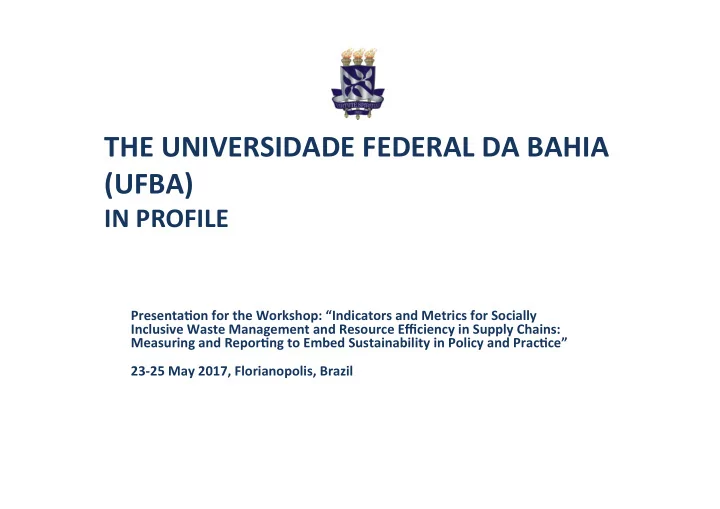

THE UNIVERSIDADE FEDERAL DA BAHIA (UFBA) IN PROFILE Presenta:on for the Workshop: “Indicators and Metrics for Socially Inclusive Waste Management and Resource Efficiency in Supply Chains: Measuring and Repor:ng to Embed Sustainability in Policy and Prac:ce” 23-25 May 2017, Florianopolis, Brazil
WHERE IS UFBA? Brazil’s Northeast Bahia • Bahia is the largest state at the Northeast of Brazil – approximately 564 million km² and nearly to 15 million inhabitants, being slightly larger than France; • It is the 6th largest economy in Brazil, and the capital is Salvador.
Bahia • Bahia has the largest coastline in Brazil (900 km) to the Atlan:c Ocean; • Bahia and Salvador are well known for their historical side as well as for their beaches, culture and tourism.
UFBA • The UFBA is one of the oldest universi:es in Brazil, founded on February 18th, 1808 as the School of Surgery (today the UFBA Faculty of Medicine); • While Bahia possesses several ins:tu:ons of higher educa:on, including three state and federal public universi:es and an advanced ins:tute, in addi:on to several private Facul:es, the UFBA is by far the largest university of Bahia, and has three campuses.
UFBA’S Three Campuses • Salvador has nearly 3 million inhabitants today. It is the most populous city in Brazil’s Northeast and the 3rd largest in Brazil. • Vitória da Conquista is the 3rd city in Bahia, with approximately 319 thousand inhabitants; • Camaçari is the industrial city in Bahia, with approximately 161 thousand inhabitants.
CAMPUS SALVADOR
UFBA IN NUMBERS (2017)* UNIVERSITY 36.177 2.933 4.197 7.740 GRADUATE UNDERGRADUATE PROFESSORS SUPPORT STAFF STUDENTS STUDENTS *These data are available in: <hmp://www.proplan.uoa.br/esta:s:cas/uoa-em-numeros> Cláudia Barreto - Manager
Polytechnic School of Engineering • Founded in 1897 (118 y.o.) as a private school of engineering, the Polytcehnic School of Engineering was incorporated to UFBA in 1946. It is one of the oldest schools of engineering in Brazil. • - 11 undergraduaLon courses • - 13 graduaLon courses ( stricto sensu ) • - around 5200 students • - 230 professors
Polytechnic School of Engineering • UNDERGRADUATION COURSES • GRADUATION COURSES • Civil Engineering • Masters in Urban & Environmant • Mining Engineering Engineering • Electrical Engineering • Masters in Electrical Engineering • Mechanical Engineering • Masters in Structural Engineering • Chemical Engineering • Masters in Industrial Engineering • Environmental Engineering • Masters in Chemical Engineering • Produc:on Engineering • Masters in Mechatronics • Computa:on Engineering • Masters in Sanita:on and Water • Automa:on & Control Engineering Resources • Cartographic Engineering • Doctorate in Energy and Environment • Transports Engineering • Doctorate in Electrical Engineering • Doctorate in Industrial Engineering • Doctorate in Chemical Engineering • Doctorate in Mechatronics
Background Ø Bachelosr in Civil Engineering (1997 – UFC) Ø Masters in Production Engineering (2000 – UFSC) Ø PhD in Industrial Engineering (2007 - FEUP) Position Ø Associate Professor at Federal University of Bahia (Dept. of Mechanical Engineering) Ø Undergraduation (Production Engineering): SCM, Industrial Costing, Engineering Economics Ø Graduation (Industrial Engineering; Energy & Environment): Sustainable SCM, SCM for Renewable Energy Systems
CIEnAm – Center Interdisciplinar in Energy and Environment Cláudia Barreto - Manager
Science Highlights
CAPES – in 2017 32 students PhD FINEP / PETROBRAS/ANP CAPES CNPq / FAPESB training of qualified human resources and conducting scientific research, technology and innovation in the following Areas of expertise : Ø Fossil fuels (productive chain of oil and gas); Ø Biomass (Biofuels, Gasification etc.); Ø Generation and eco-efficient use of energy; Ø Environmental impacts in the atmosphere, lithosphere, hydrosphere and in life; Ø clean technology; Ø Nanotechnology and new materials; and Ø Regulation and management.
Current research and research interests: Ø Sustainable SCM (productive chain of oil and gas); Ø Reverse Logistics Systems (scrap tyres, pesticide packings, construction waste, etc) Ø SCM applied to Biomass (Biofuels, Gasification, etc.); Ø Generation and eco-efficient use of energy; Ø Environmental impacts of Logistics Systems; Ø Regulation and management of energy systems; Ø WASTE TO ENERGY SCM; Ø CIRCULAR ECONOMY
Obrigado por sua atenção! francisco.gaudencio@uoa.br www.eng.uoa.br www.cienam.uoa.br
Recommend
More recommend